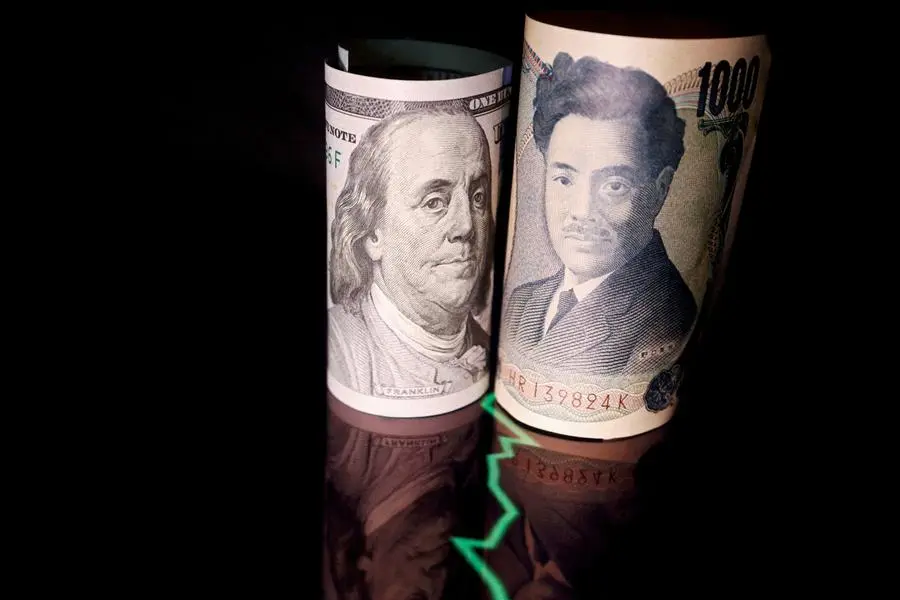PHOTO
SINGAPORE - The yen rose to its strongest level against the dollar in 2-1/2 months on Thursday and scaled multi-month highs against other currencies ahead of next week's Bank of Japan (BOJ) meeting, as yen carry trades unwound and risk appetite soured.
The dollar, euro, sterling and other major currencies slumped more than 1% against the yen by the mid-morning in Asia, before paring some of those losses. Analysts attributed the yen's surge to the abandoning of short yen bets in the run up to the BOJ's July meeting, where a rate hike remains on the cards.
Sources told Reuters that the central bank is likely to debate whether to raise interest rates next week and unveil a plan to roughly halve bond purchases in coming years, signalling its resolve to steadily unwind its massive monetary stimulus.
Against the dollar, the yen was last up 0.7% at 152.81, after having surged earlier in the session to its highest since May 3 at 152.23.
The euro fell 0.7% to 165.59 yen, while sterling and the Australian dollar lost 0.85% and 1.3% against the Japanese currency, respectively.
"We know that the speculative community had very large short yen positions, and as the unwinding was happening, I think a lot of stops got triggered and a lot of those short yen positions started to get stopped out," said Khoon Goh, head of Asia research at ANZ.
"Markets are also starting to contemplate BOJ action next week as well, so I think that's also contributing to the further unwinding of the yen shorts."
The yen also received some safe-haven support as risk sentiment took a hit after Wall Street ended sharply lower amid an ongoing rotation out of technology stocks.
"I think it's just a perfect storm at this point of time. You've got unwind in the tech trade, you've got unwind in the carry yen trade... you've got the Nikkei, as well, unwinding," said Tony Sycamore, a market analyst at IG.
The bout of risk aversion took a toll on the Australian and New Zealand dollars, which were already under pressure from weakening commodity prices.
The Australian dollar fell 0.55% $0.6545, while the kiwi similarly hit a 2-1/2-month trough of $0.5913.
Both Antipodean currencies were on track for weekly falls of 1.5% and 1.3%, respectively.
Elsewhere, the euro was flat at $1.0839, while sterling fell 0.12% to $1.2890.
Separate PMI surveys out on Wednesday showed growth in euro zone business activity stalled in July, while British business activity picked up the same month.
U.S. business activity also climbed to a 27-month high in July, but firms appeared to have some difficulty sustaining higher prices for their goods and services amid resistance from consumers.
"Altogether, the PMI releases haven't changed our view that the ECB, BoE and Fed will cut interest rates in September," said Ariane Curtis, senior global economist at Capital Economics.
Traders also have their eye on second-quarter U.S. growth figures later on Thursday, though the outcome is unlikely to significantly alter bets for Federal Reserve rate cuts this year, with a September move already fully priced in.
Against a basket of currencies, the dollar fell a touch to 104.28, though that was largely on the back of the yen's rise.
In China, the yuan rose 0.15% to 7.2533 per dollar.
The Chinese central bank surprised markets for a second time this week by conducting an unscheduled lending operation at steeply lower rates on Thursday, suggesting authorities are trying to provide heavier monetary stimulus to prop up the struggling economy.
The same day, five of the major state-owned banks said they would cut deposit rates, marking the first broad reduction in deposit rates by Chinese banks since December last year.
(Reporting by Rae Wee; Editing by Sam Holmes, Miral Fahmy and Subhranshu Sahu)





















